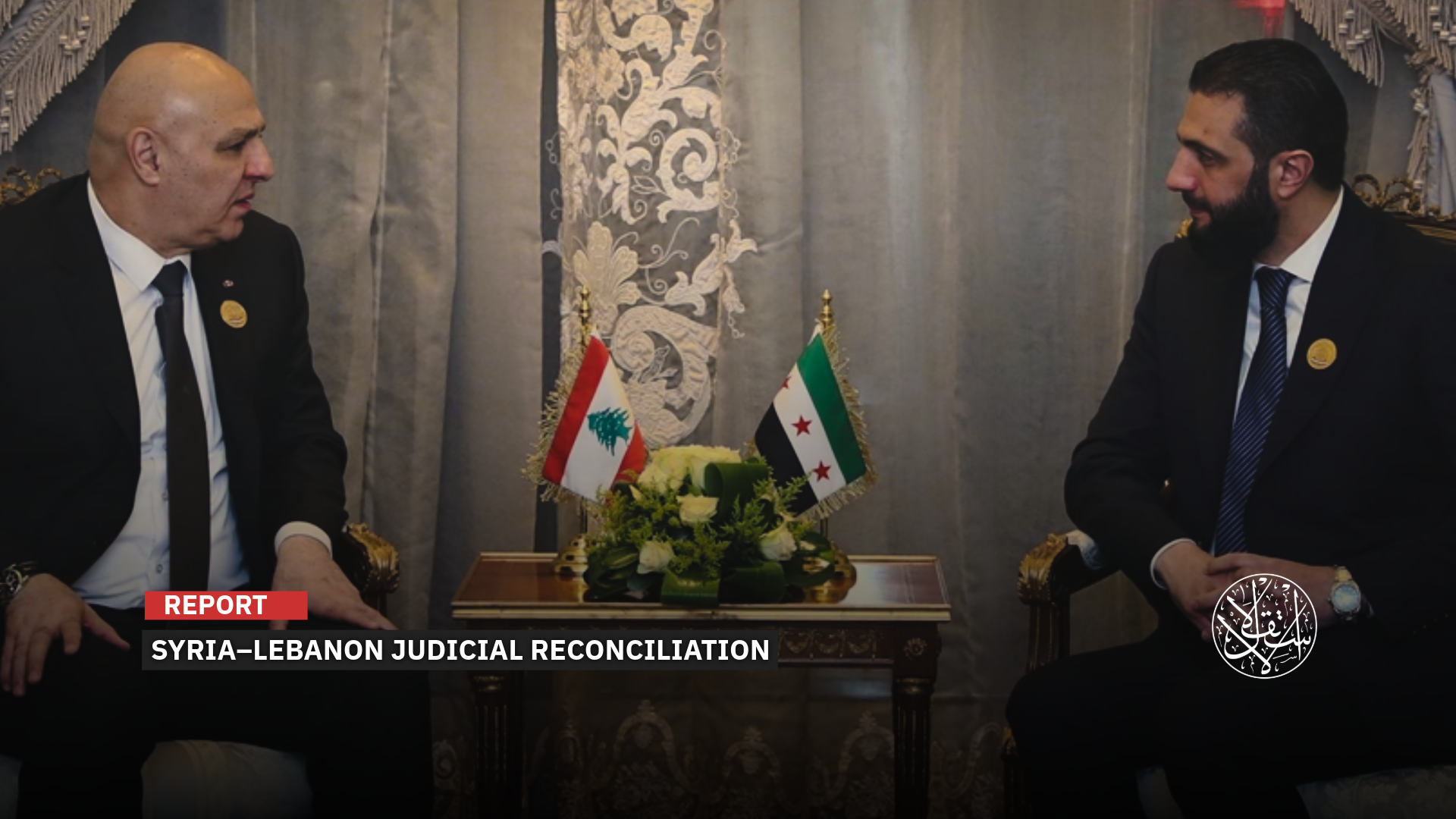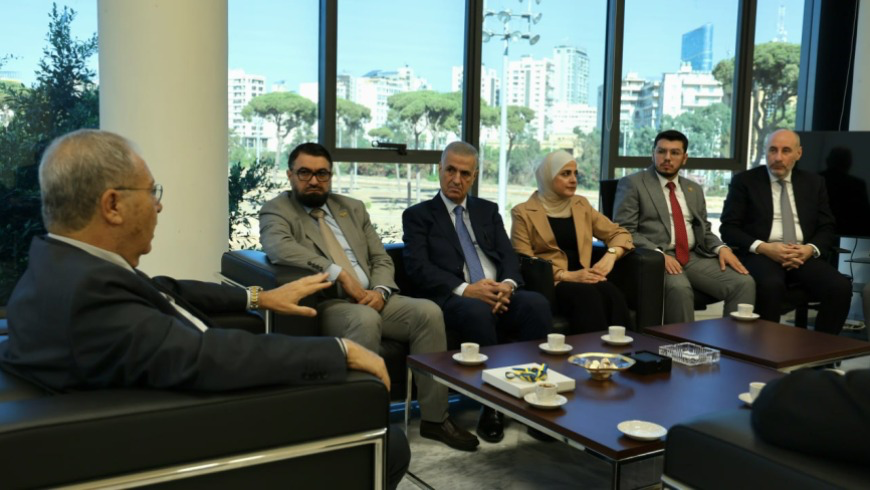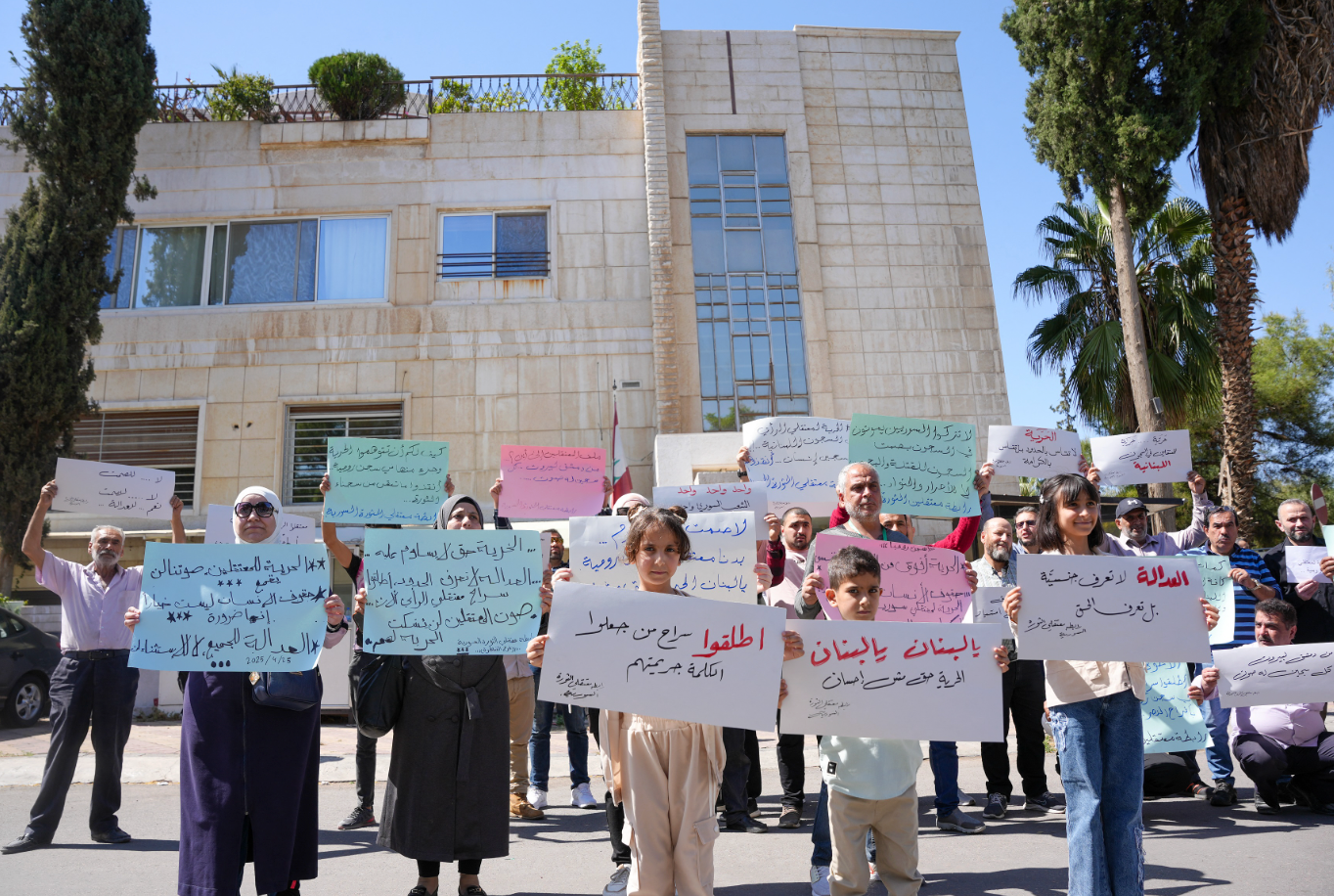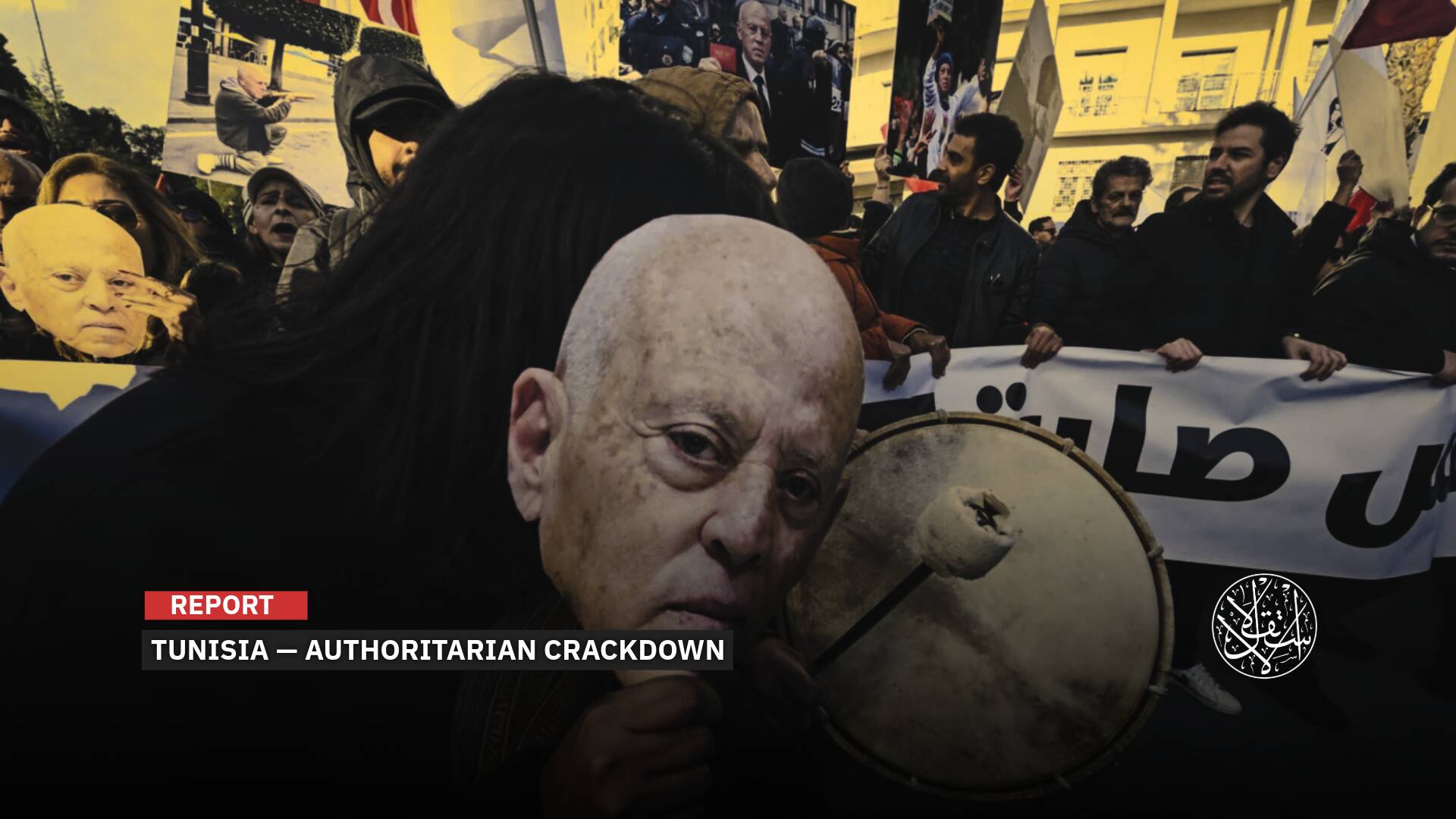Syria and Lebanon Edge Toward Judicial Deal: Is Delayed Justice Finally Within Reach?

Judicial cooperation has played a crucial role in uncovering the background of political assassinations.
Following the fall of Bashar al-Assad’s regime, Syria and Lebanon have sought to open a new chapter in their relations, one based on mutual respect, sovereignty, and noninterference in each other’s affairs.
Yet, Damascus and Beirut continue to view the unresolved issues between them as one of the main obstacles to advancing political ties and deepening cooperation between the two nations.

Judicial Cooperation
In a new development, Syria and Lebanon have moved closer to signing a judicial cooperation agreement, following a series of meetings between officials at the formal level.
Syria’s justice minister, Mazhar al-Wais, announced on October 14, 2025, that progress had been made in discussions on reaching a judicial cooperation agreement with Lebanon, noting that the two countries’ positions were closely aligned and that the process was proceeding within the proper legal framework.
The announcement came during a press conference in Beirut alongside his Lebanese counterpart, Adel Nassar, and Lebanon’s deputy prime minister, Tarek Metri, according to the Syrian news agency SANA.
“The positions of the two countries are closely aligned, and matters are proceeding within the correct legal framework,” he added.
Al-Wais explained that the talks had addressed issues of judicial cooperation concerning Syrian detainees in Lebanon, Syrians wanted by the law who had fled to Lebanon, and Lebanese nationals who had fled to Syria.
The Syrian justice minister also noted that the discussions had covered “old files related to cooperation on security cases that occurred in Lebanon.”
He highlighted that special teams had been formed to pursue the uncovering of truth and the delivery of justice.
The visit followed a trip to Beirut on October 10, 2025, by Syria’s foreign minister and expatriates’ affairs minister, Asaad al-Shaibani, justice minister Mazhar al-Wais, and the head of the General Intelligence Directorate, Hussein al-Salama.
Al-Shaibani’s visit marked the first by a senior Syrian official to Lebanon since the fall of al-Assad. He emphasized that Syria’s current authorities “respect Lebanon’s sovereignty” and the principle of “non-interference in its internal affairs,” adding, “We want to move beyond the obstacles of the past with Lebanon.”
Meanwhile, Lebanese justice minister Adel Nassar said during the meeting with al-Wais that “the drafting of the judicial agreement has made significant strides toward finalizing its legal text.”
“The agreement does not cover those involved in murder, whether of civilians or Lebanese military personnel, or in cases of rape,” Nassar said.
Nassar described the meeting as “constructive and positive,” noting that it had addressed issues concerning those who had fled justice from Lebanon to Syria, the sharing of security information, political assassinations carried out in Lebanon by the former regime, and the issue of those forcibly disappeared.
He underscored that “both the Syrian and Lebanese sides are committed to respecting the legal frameworks of the agreement, ensuring the sovereignty of both countries,” pointing to “a strong desire for joint cooperation.”
According to the Lebanese Ministry of Justice, it was agreed that full support would be provided to the committee monitoring forcibly disappeared individuals, in addition to handing over all available information held by Syria on security operations that took place in Lebanon during the rule of al-Assad father and son, particularly political assassinations, as well as tracking and returning those who had fled Lebanese authorities to Syria.
Lebanese officials regard this period as one of the most “bloody and dark,” having witnessed extreme forms of repression, murder, and assassination under Assad’s control of Lebanon, which lasted from 1976 until 2005.
Under the cover of the Arab League, Syrian troops entered Lebanon in December 1976, at a time when the civil war had been raging for a year. Syria’s stated aim was to end the conflict and restore the situation to what it had been before the war.
However, the decisive end to Syria’s presence in Lebanon came on March 5, 2005, when Bashar al-Assad addressed the People’s Assembly and announced the withdrawal of Syrian forces, completed on April 26 that year.
The withdrawal followed widespread protests in Lebanon after the assassination of Prime Minister Rafic Hariri on February 14, 2005, in a Beirut bombing, with accusations that al-Assad’s regime was behind the killing, alongside a series of other targeted assassinations of political and media figures at the time.
Meanwhile, Lebanon has remained rigid on handling the situation of Syrian detainees in its prisons. The issue was expected to progress more quickly after al-Assad’s fall in December 2024, but it remains stalled, despite committees and delegations being convened to address the matter.
Syrian prisoners are held at Roumieh prison east of Beirut, numbering around 2,200, facing charges ranging from participation in the Syrian uprising to issues related to seeking refuge in Lebanon.
During al-Assad’s former regime, these detainees were imprisoned in Roumieh after being arrested for their participation in the Syrian revolution.
Human rights organizations have documented the deaths of around 29 Syrian prisoners in Roumieh over the past years due to medical neglect, including one man who suffered from heart disease for three months before dying in custody.

Mutual Benefit
In this context, the judicial momentum between Beirut and Damascus has opened a new channel of engagement, the reverberations of which continue to be felt across legal and political circles, particularly as it touches on contentious issues dating back to periods of assassinations and political division in Lebanon.
Experts describe the move as “positive,” noting that it marks a departure from the previous relationship, which had been marred by patronage and an imbalance between the two countries.
Addressing the situation of Syrian prisoners and other detainees in Lebanon, who have remained untried due to a paralyzed judicial system in recent years, is now considered an urgent necessity following al-Assad’s fall, especially given the humanitarian implications for hundreds of families.
Judicial cooperation, experts say, also lays the groundwork for the legal transfer of wanted individuals between the two countries, provided there are official warrants or Interpol notices, ensuring that such handovers follow proper legal procedures rather than arbitrary or politically motivated methods.
In this sense, genuine judicial collaboration between Syria and Lebanon is not merely a political step, but a fundamental condition for achieving justice, stabilizing both countries, addressing victims’ grievances, and building a relationship founded on mutual respect and the rule of law.
Within this framework, Lebanese lawyer and legal expert Mohammad Sablouh told Al-Estiklal, “The current meetings between officials in Lebanon and Syria, particularly in the justice and foreign ministries, along with the delegations visiting both countries, have broken the ice and created a positive impression about the future of bilateral relations, which is extremely important.”
“A judicial agreement is currently being coordinated to address the cases of Syrian prisoners in Lebanon, alongside another agreement concerning political assassinations that occurred in Lebanon, which is also a highly sensitive and significant issue,” he added.
“Regarding the Syrian prisoners, it is crucial that the agreement be comprehensive, covering all cases and issues related to them, rather than piecemeal, because justice cannot be divided.”
“At some point, Lebanon must acknowledge the mistakes committed during Bashar al-Assad’s rule, particularly since some of the security and judicial violations in Lebanon were carried out in line with the agendas of intelligence black rooms, including al-Assad’s own networks,” Sablouh noted.
“Lebanon cannot release some prisoners while keeping others detained under any pretext, as many of the cases were fabricated by Lebanese security agencies, according to documentation carried out with international organizations.”
“Addressing this issue must be comprehensive and non-selective, because any agreement signed between the justice ministers of the two countries must pass through the Lebanese parliament. Ideally, a full legal draft should be prepared to deal with the matter of Syrian prisoners in Lebanon in its entirety,” he concluded.

Delayed Justice
Between 1976 and 2005, Lebanon experienced a significant Syrian security presence, which extended to a direct influence over the country’s political and security decisions.
Prominent Lebanese figures opposed this influence and called for the consolidation of state sovereignty, only to be assassinated under mysterious circumstances.
Investigations have also revealed assassination networks suspected of coordinating with security agencies linked to the deposed al-Assad regime.
Several operations were preceded by Syrian political statements or messages from its allies in Lebanon, often containing veiled threats, most notably the assassination of former Prime Minister Rafic Hariri in 2005.
Although there has been no direct judicial ruling against al-Assad regime, political and security indicators, along with testimonies from numerous officials, have led to accusations that al-Assad’s regime was either the primary beneficiary or directly or indirectly involved in the assassinations targeting political and party leaders, journalists, and religious figures, many of which remain unsolved or shrouded in incomplete investigations.
According to Mohammad Sablouh, “This judicial agreement is extremely important regarding the issue of political assassinations in Lebanon during al-Assad era (Hafez and Bashar), as it will make it possible to identify those who committed these crimes, prevent them from being dismissed by statutes of limitations, and send a clear message for the future: anyone thinking of committing a political crime will eventually be held accountable.”
“Judicial and security cooperation between the two countries will have a significant impact on uncovering the background of political assassinations and revealing truths that have been hidden from the public for over 50 years.”
“The hope remains that these announced positive steps will translate into practical reality through addressing prison conditions, identifying the real perpetrators, and exposing the hidden motives behind the crimes and assassinations that Lebanon has witnessed,” Sablouh continued.
“The exchange of security and judicial information helps prevent organized crime, arms trafficking, terrorism, and drug networks, while also limiting the movement of criminals or wanted individuals between the two countries.”
At the same time, potential Lebanese cooperation with the new Syrian state could bring serious revelations, potentially exposing collusion between Lebanese figures and the Assad regime in a series of assassinations.
Following al-Assad’s fall, Lebanon requested information on those who had fled justice as Syrian fugitives, namely Khidr al-Irouni, Habib Tanious Shartouni, accused of assassinating former President Bachir Gemayel in 1982.
Similarly, those involved in the double bombings at the Al-Salam and Al-Taqwa mosques in Tripoli on August 23, 2013, during Friday prayers, remain under scrutiny.
The devastating blasts killed 47 people and injured hundreds, and at the time, local media reported that six of the suspects had fled to Syria.
Justice in this case has remained delayed, particularly after Lebanese authorities later sentenced eight of the accused to death, while arrest warrants were issued for the fugitives, including Muhammad Ali, Nasser Jouban, Hayan Ramadan, Ahmad Mar’i, and Salman Assad.
In March 2025, Syria’s Internal Security Service captured Ibrahim Huweija, the former head of Syria’s Air Intelligence from 1987 to 2002, in the coastal city of Jableh. He is accused of carrying out assassinations during the presidency of Hafez al-Assad.
The Syrian news agency SANA reported that Huweija is suspected of involvement in “hundreds of assassinations” under al-Assad family, including overseeing the assassination of Lebanese Druze leader Kamal Jumblatt on March 16, 1977.
On X, former MP Walid Jumblatt, who inherited leadership after his father’s assassination, reshared the report with the comment, “Allahu Akbar.”
Kamal Jumblatt had long accused al-Assad regime of orchestrating his father’s assassination, in which unknown gunmen intercepted his car amid Syria’s intervention in Lebanon’s civil war, which raged from 1975 to 1990.
Sources
- Syria and Lebanon: Moving Closer to a Judicial Agreement on the Exchange of Prisoners and Wanted Individuals [Arabic]
- Syria Reports Progress on Reaching a Judicial Cooperation Agreement with Lebanon [Arabic]
- After Opening the File on Political Assassinations… Could the Wall of Impunity Finally Be Broken? [Arabic]
- Aoun and Al-Shar’ Discuss the “Necessity” of Controlling the Lebanese-Syrian Border [Arabic]
- Death Sentences for Eight Accused in the Al-Taqwa and Al-Salam Mosque Bombings [Arabic]









